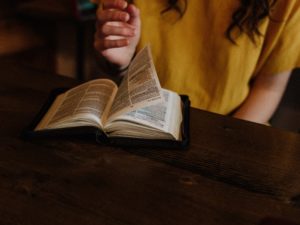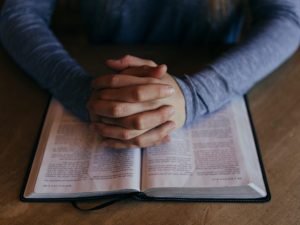There’s something about the start of a new year that inspires greater intentionality in personal reflection and prayer. As you celebrate the start of 2021 (or simply that 2020 is over), considering letting the Psalms shape your conversations with God. This collection of poems in the Bible help us to know what to say to God, and what he might say back to us. To get you started, here is a reflection guide based on Psalm 25.
Getting Ready to Pray:
Before you dive into prayer, consider taking a moment to get settled.
- Remove distractions: are there sounds, smells, or sights in your space that might be especially distracting? Intruding thoughts can be saved for later by writing them down.
- Be aware of your body: Are you uncomfortable? Tense? Hungry? Sleepy? Of course you can still pray if you are, but it might be worth attending to your physical needs first.
- Commit to this time: What would you like to say to yourself about prayer? It can be helpful to remind yourself that it is God who invites you to talk to him.
- Invite the Holy Spirit to help you talk to God and to listen for how he is responding. Throughout this guide, there will be spaces left to hear God’s voice—but if nothing seems to happen, that’s perfectly okay.
Praying through Trust and Doubt
1 O LORD, I give my life to you.
2 I trust in you, my God!
Do not let me be disgraced,
or let my enemies rejoice in my defeat.
3 No one who trusts in you will ever be disgraced,
but disgrace comes to those who try to deceive others.
Did you notice? The poet declares their trust and admits their fears of being shamed. Faith is present (“No one who trusts in you will ever be disgraced”), but so is a fear of being disappointed or dishonoured (“Do not let me be disgraced”). Doubt does not need to be hidden from God.
As you settle into prayer:
- What do you want to say to God about your trust?
- What do you want to say to God about your doubts and fears?
Read these three verses again and pause before moving on. In your silence, how might God be responding to your trust and doubt?
Asking for Guidance
4 Show me the right path, O LORD;
point out the road for me to follow.
5 Lead me by your truth and teach me,
for you are the God who saves me.
All day long I put my hope in you.
It seems that seeking direction involves a willingness to be led and taught “all day long,” and a desire to be put on the right “road for me to follow.”
In your own words to God:
- Where do you need leading and teaching today?
- How will you need guidance to find the right path in the weeks and months to come?
Read these two verses again slowly. As you pause before moving on, what comes to mind? Might these thoughts come from God?
Acknowledging God’s Goodness and Our Sin
6 Remember, O LORD, your compassion and unfailing love,
which you have shown from long ages past.
7 Do not remember the rebellious sins of my youth.
Remember me in the light of your unfailing love,
for you are merciful, O LORD.
8 The LORD is good and does what is right;
he shows the proper path to those who go astray.
9 He leads the humble in doing right,
teaching them his way.
10 The LORD leads with unfailing love and faithfulness
all who keep his covenant and obey his demands.
11 For the honour of your name, O LORD,
forgive my many, many sins.
Confessions of God’s unfailing love are woven into this confession of sin. It seems that God’s goodness is not a reason to cower in shame, but a reason to boldly approach and ask for mercy.
With a humble confidence, reflect back to God:
- How are you aware of God’s goodness towards you?
- How are you aware of your failings?
As you reread these six verses, what stands out to you? How might God be speaking to you through these words? Pause and leave room for his voice.
Committing to Wisdom
12 Who are those who fear the LORD?
He will show them the path they should choose.
13 They will live in prosperity,
and their children will inherit the land.
14 The LORD is a friend to those who fear him.
He teaches them his covenant.
15 My eyes are always on the LORD,
for he rescues me from the traps of my enemies.
These verses reflect what this poet has already learned about life with God, especially noting things that are generally true of “those who fear the Lord.” The poet then commits to live in this wisdom, keeping their eyes “always on the Lord.”
As you think back over the last year:
- What have you learned about life with God?
- How would you like these lessons to change the way you live in the coming year?
Read this set of verses again, leaving space after. As you imagine your eyes on God, what might he be communicating back to you?
Naming the Dangers and Requesting Protection
16 Turn to me and have mercy,
for I am alone and in deep distress.
17 My problems go from bad to worse.
Oh, save me from them all!
18 Feel my pain and see my trouble.
Forgive all my sins.
19 See how many enemies I have
and how viciously they hate me!
20 Protect me! Rescue my life from them!
Do not let me be disgraced, for in you I take refuge.
21 May integrity and honesty protect me,
for I put my hope in you.
Nothing is held back in this description of trouble and plea for help—there is honesty and even hyperbole. God is invited to not only do something, but also to be in these issues, to “feel” and “see” with the poet.
Praying with honesty and even some poetic hyperboles:
- What challenges are you facing?
- How would you like to experience God’s presence and power in these challenges?
As you read this a second time, how are you already encountering God’s nearness, even if only as a whisper?
Remembering God’s People
22 O God, ransom Israel
from all its troubles.
This last little verse is small but important: it recalls the broader community of God’s people. Although this community is not the focus of this particular psalm, its inclusion reminds us that we don’t just operate independently of other Christians.
As you bring this prayer to a close:
- Who would you like to thank God for from the past year?
- What would you like to ask God for on behalf of others for the year ahead?
As you reread this final verse, does it feel like you’ve been invited to say or do anything for the people you’ve just prayed for? How might God be inviting you to respond to him by responding to them?
Saying Amen
If something special came to mind while you were praying, it’s worth taking the time to record it in a journal or video. But even if not, don’t feel that you’ve prayed “wrong”—God has heard you!
Even though a fresh start can feel a little magical, the beginning of 2021 is not your only chance to pray. Finish your time of prayer knowing that it’s okay if not everything was said in one sitting. You may be saying “Amen” in this moment, but not good-bye. For God goes with you into your next chapter.
"*" indicates required fields
Share this!
About the Author





